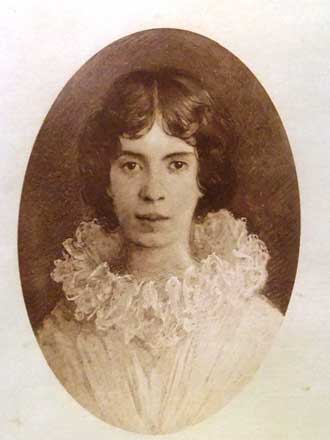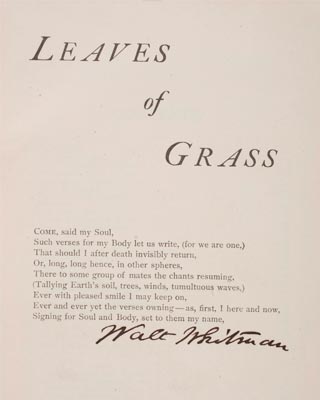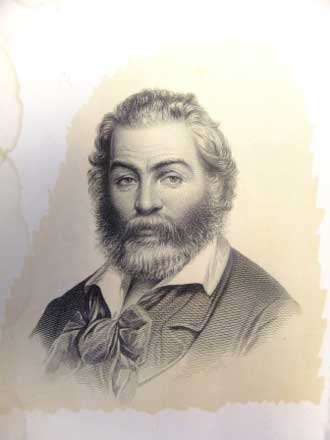The King James Bible first arrived in America in 1630 with John Winthrop who was to become Governor of Massachusetts. Although the Geneva Bible had been brought over by the Puritans in 1560, the KJB gradually became more popular. Being widely read, and read aloud, it exerted a strong influence on American English and the formation of national identity

Nineteenth Century America
The King James Bible first arrived in America in 1630 with John Winthrop, later Governor of Massachusetts. It provided both a blueprint and a vision for the new colony and by the 19th century was deeply influential upon with work of writers such as Emily Dickinson, Walt Whitman and Herman Melville.
Emily Dickinson
Poet Emily Dickinson (1830-86) was born into a family of Puritan heritage and educated at Amherst College, Massachusetts. Reading the KJB was an essential part of her home and community life and she was therefore very familiar with its text. Biblical allusions and metaphors, most often from Genesis, Revelation and the four Gospels, as well as references to the Old Testament books of Deuteronomy and Isaiah and the Psalms occur frequently in her poetry and letters.
Dickinson frequently employed a compact writing style, as for an aphorism. She used a biblical word or phrase as a springboard for her own, often unconventional, reflections on the world, relationships, spirituality and poetry. Poem 1657 offers one example:

and for another instance:
A Word made Flesh is seldom
And tremblingly partook...
(Read the rest of poem 1651)
('The word made flesh' is taken from John 1:14).
Emily Dickinson is known to have relished the somewhat non-contemporary style of expression of the KJB and refers to it in familiar terms in Poem 1545:

Further Reading
Jack Capps, ‘The King James Version’ in Emily Dickinson’s reading 1836-1886 (Cambridge, MA: Harvard University Press, 1966), pp. 27-59.
Resources Online
Biography of Emily Dickinson on the Poetry Foundation. Includes profile, poems, audio and podcasts.
Works by Emily Dickinson on Project Gutenberg

Emily Dickinson
Frontispicee to the Poems of Emily Dickinson edited by Martha Dickinson Bianchi and Alfred Leete Hampson (London, Jonathan Cape, 1947)

Title page of Leaves of Grass (Camden, N.J. : [Walt Whitman], 1882) (1.5MB)

Walt Whitman
Frontispiece to Leaves of Grass (Boston: Thayer and Eldridge, year 85 of the States (1860-61) Boston George C. Rand & Avery).
Walt Whitman
‘No true bard will ever contravene the Bible’: so said Walt Whitman in his essay 'The Bible As Poetry' in November Boughs V. In common with many writers of period, Walt Whitman frequently alluded to the Bible in his poetry, although it is seldom quoted directly. Christ and the prophets are used frequently, particularly in Leaves of Grass. In ‘Song of Myself’ Whitman explores the idea that he himself is Christ (‘Divine I am inside and out, and I make holy whatever I am touch or am touch’d from...’) (section 524). All of nature and humanity is integrated and should therefore be celebrated as one.
Whitman intended Leaves of Grass to become a sacred text in its own right, referring in an 1857 notebook to his ‘Great Construction of the New Bible’. Many elements of biblical style can be found in Whitman’s narrative and rhetorical techniques, for example:
'I am the poet of the Body and I am the poet of the Soul,
The pleasures of heaven are with me and the pains of hell are
with me...'
There was child went forth every day,
And the first object he look’d upon, that object he became....,
Thou, thou, the Ideal Man,
Fair, able, beautiful, content, and loving,
Complete in body and dilate in spirit,
Be thou my God...
Further Reading
Walt Whitman: An Encyclopedia ed. by J. Le Master and Donald Kummings (New York, NY/London: Garland, 1998).
Walt Whitman, Complete Poetry and Collected Prose. (New York, NY: Literary Classics of the United States; Distributed by Viking Press, 1982).
Leaves of Grass, ed. by Harold Blodgett and Sculley Bradley (New York, NY: New York University Press, 1965).
Resources Online
The Walt Whitman Archive. Includes biography, correspondence, manuscripts, audio files and finding aids.
Walt Whitman on the Poetry Foundation. Includes profile, poems, audio and podcasts.
Resources@Canterbury
Walt Whitman, Leaves of Grass. Camden, NJ: [Walt Whitman], 1882. Autographed by the author.